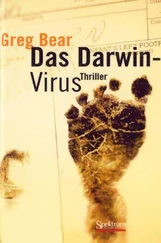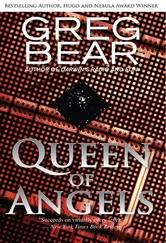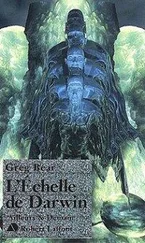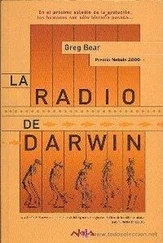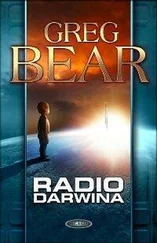Marian took his day pass and ran it through the scanner. The steel door opened to a horizontal spread of sunglass-green access tubes, suspended like a hamster maze over a two-acre basin of raw gray concrete. She held out her hand, letting him go first. “You know about Shiver firsthand.”
“It went away in a couple of weeks,” Dicken said.
“It lasted five weeks, and it damned near killed you. Don’t bullshit me with your virus hunter bravado.”
Dicken stepped slowly onto the catwalk, having difficulty judging depth with just one eye, and that covered by a thick lens. “The man beat his wife, Marian. She was sick with a tough pregnancy. Stress and pain.”
“Right,” Marian said. “Well, that certainly wasn’t true with Mrs. Rhine, was it?”
“Different problem,” Dicken admitted.
Freedman smiled with little humor. She sometimes revealed biting wit, but did not seem to understand the concept of humor. Duty, hard work, discovery, and dignity filled the tight circle of her life. Marian Freedman was a devout feminist and had never married, and she was one of the best and most dedicated scientists Dicken had ever met.
Together, they marched north on the aluminum catwalk. She adjusted her pace to match his. Tall steel cylinders waited at the ends of the access tubes, shaft housings for elevators to the chambers beneath the seamless concrete slab. The cylinders wore big square “hats,” high-temperature gas-fired ovens that would sterilize any air escaping from the facilities below.
“Welcome to the house that Augustine built. How is Mark, anyway?”
“Not happy, last time I saw him,” Dicken said.
“Why am I not surprised? Of course, I should be charitable. Mark moved me up from studying chimps to studying Mrs. Rhine.”
Twelve years before, Freedman had headed a primate lab in Baltimore, during the early days when the Centers for Disease Control had launched the task force investigating Herod’s plague. Mark Augustine, then director of the CDC and Dicken’s boss, had hoped to secure extra funding from Congress during a fiscal dry spell. Herod’s, thought to have caused thousands of hideously malformed miscarriages, had seemed like a terrific goad.
Herod’s had quickly been traced to the transfer of one of thousands of Human Endogenous Retroviruses—HERV—carried by all people within their DNA. The ancient virus, newly liberated, mutated and infectious, had been promptly renamed SHEVA, for Scattered Human Endogenous Viral Activation.
In those days, viruses had been assumed to be nothing more than selfish agents of disease.
“She’s been looking forward to seeing you,” Freedman said. “How long since your last visit?”
“Six months,” Dicken said.
“My favorite pilgrim, paying his respects to our viral Lourdes,” Freedman said. “Well, she’s a wonder, all right. And something of a saint, poor dear.”
Freedman and Dicken passed junctions with tubes branching southwest, northeast, and northwest to other shafts. Outside, the summer morning was warming rapidly. The sun hung just above the horizon, a subdued greenish ball. Cool air pulsed around them with a breathy moan.
They came to the end of the main tube. An engraved Formica placard to the right of the elevator door read, “MRS. CARLA RHINE.” Freedman punched the single white button. Dicken’s ears popped as the door closed behind them.
SHEVA had turned out to be much more than a disease. Shed only by males in committed relationships, the activated retrovirus served as a genetic messenger, ferrying complicated instructions for a new kind of birth. SHEVA infected recently fertilized human eggs—in a sense, hijacked them. The Herod’s miscarriages were first-stage embryos, called “interim daughters,” not much more than specialized ovaries devoted to producing a new set of precisely mutated zygotes.
Without additional sexual activity, the second-stage zygotes implanted and covered themselves with a thin, protective membrane. They survived the abortion of the first embryo and started a new pregnancy.
To some, this had looked like a kind of virgin birth.
Most of the second-stage embryos had gone to term. Worldwide, in two waves separated by four years, three million new children had been born. More than two and a half million of the infants had survived. There was still controversy over exactly who and what they were—a diseased mutation, a subspecies, or a completely new species.
Most simply called them virus children.
“Carla’s still cranking them out,” Freedman said as the elevator reached the bottom. “She’s shed seven hundred new viruses in the last four months. About a third are infectious, negative-strand RNA viruses, potentially real bastards. Fifty-two of them kill pigs within hours. Ninety-one are almost certainly lethal to humans. Another ten can probably kill both pigs and humans.” Freedman glanced over her shoulder to see his reaction.
“I know,” Dicken said dryly. He rubbed his hip. His leg bothered him when he stood for more than fifteen minutes. The same White House explosion that had taken his eye, twelve years ago, had left him partially disabled. Three rounds of surgery had allowed him to put aside the crutches but not the pain.
“Still in the loop, even at NCI?” Freedman asked.
“Trying to be,” he said.
“Thank God there are only four like her.”
“She’s our fault,” he said, and paused to reach down and massage his calf.
“Maybe, but Mother Nature’s still a bitch,” Freedman said, watching him with her hands on her hips.
A small airlock at the end of the concrete corridor cycled them through to the main floor. They were now fifty feet below ground. A guard in a crisp green uniform inspected their passes and permission papers and compared them with the duty and guest roster at her workstation.
“Please identify,” she told them. Both placed their eyes in front of scanners and simultaneously pressed their thumbs onto sensitive plates. A female orderly in hospital greens escorted them to the cleanup area.
Mrs. Rhine was housed in one of ten underground residences, four of them currently occupied. The residences formed the center of the most redundantly secure research facility on Earth. Though Dicken and Freedman would never come any closer than seeing her through a four-inch-thick acrylic window, they would have to go through a whole-body scrub before and after the interview. Before entering the viewing area and staging lab, called the inner station, they would put on special hooded undergarments impregnated with slow-release antivirals, zip up in plastic isolation suits, and attach themselves to positive pressure umbilical hoses.
Mrs. Rhine and her companions at the center never saw real human beings unless they were dressed to resemble Macy’s parade balloons.
On leaving, they would stand under a disinfectant shower, then strip down and shower again, scrubbing every orifice. The suits would be soaked and sterilized overnight, and the undergarments would be incinerated.
The four women interned at the facility ate well and exercised regularly. Their quarters—each roughly the size of a two-bedroom apartment—were maintained by automated servants. They had their hobbies—Mrs. Rhine was a great one for hobbies—and access to a wide selection of books, magazines, TV shows, and movies.
Of course, the women were becoming more and more eccentric.
“Any tumors?” Dicken asked.
“Official question?” Freedman asked.
“Personal,” Dicken said.
“No,” Freedman said. “But it’s only a matter of time.”
Dicken handed the flowers to the orderly. “Don’t boil them,” he said.
“I’ll process them myself,” the orderly promised with a smile. “She’ll get them before you’re done here.” She passed them two sealed white paper bags containing their undergarments and showed them the way to the scrub stalls, then to the tall cabinets that held the isolation suits, as glossy and green as dill pickles.
Читать дальше
Конец ознакомительного отрывка
Купить книгу

